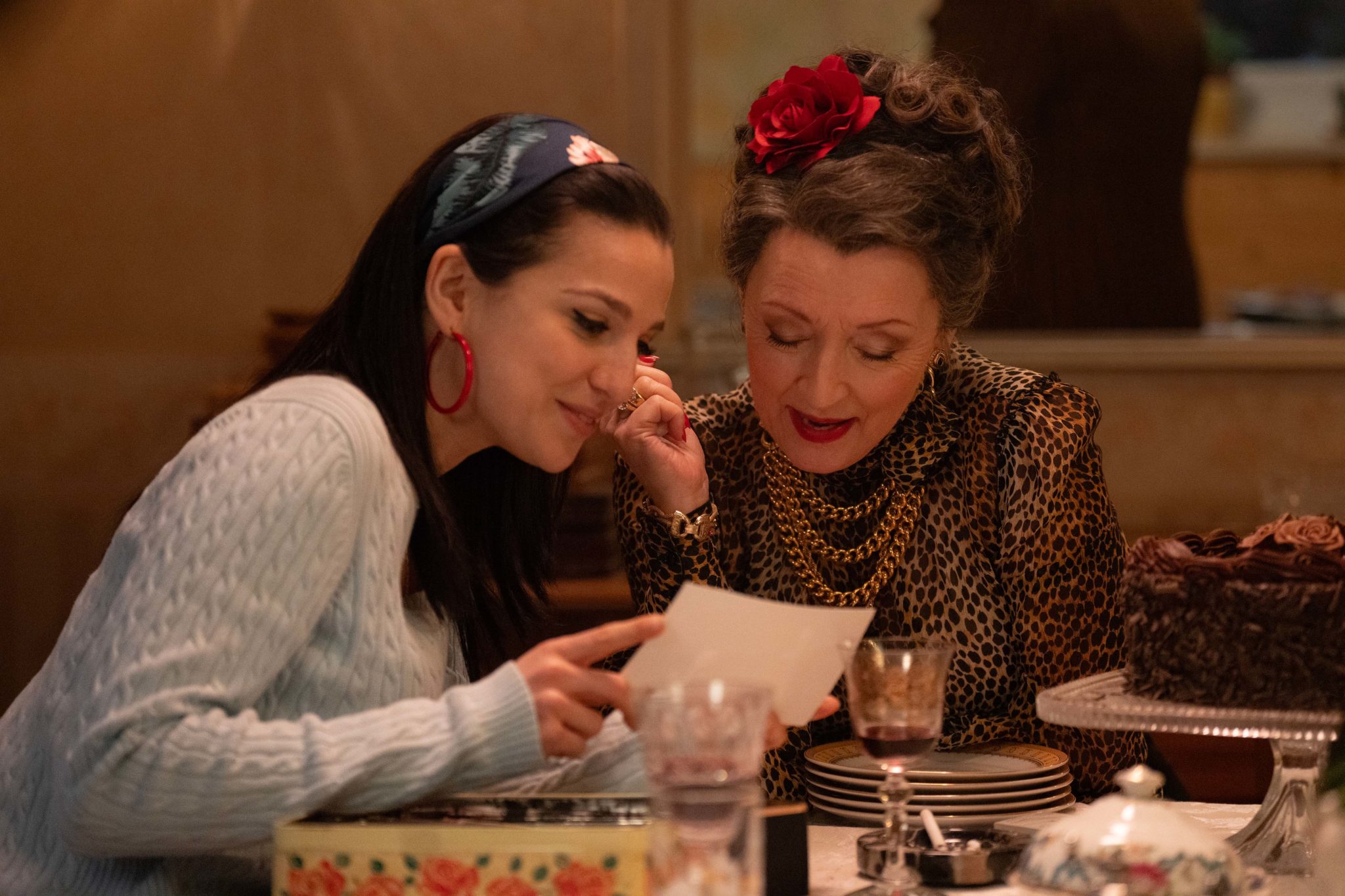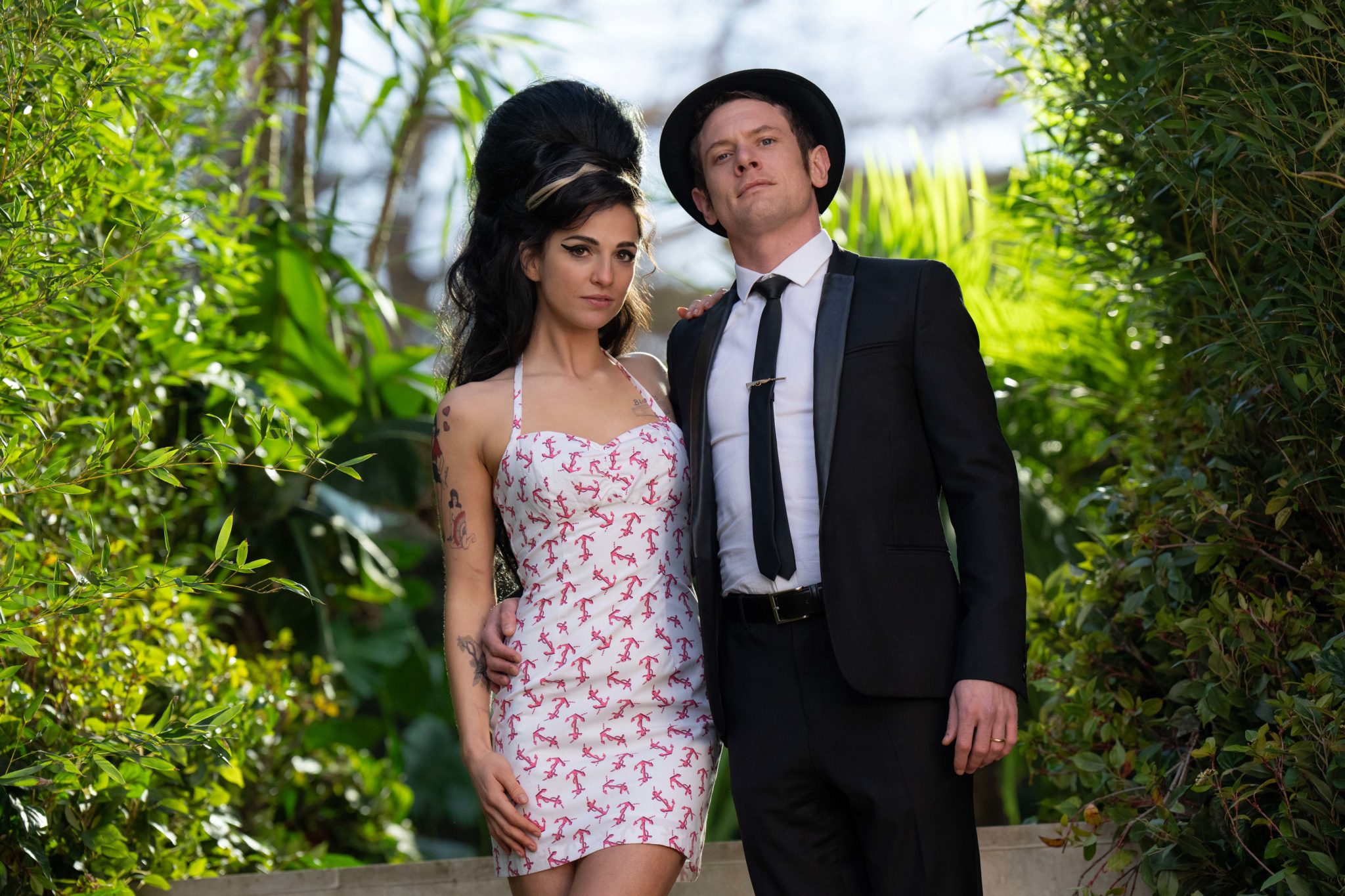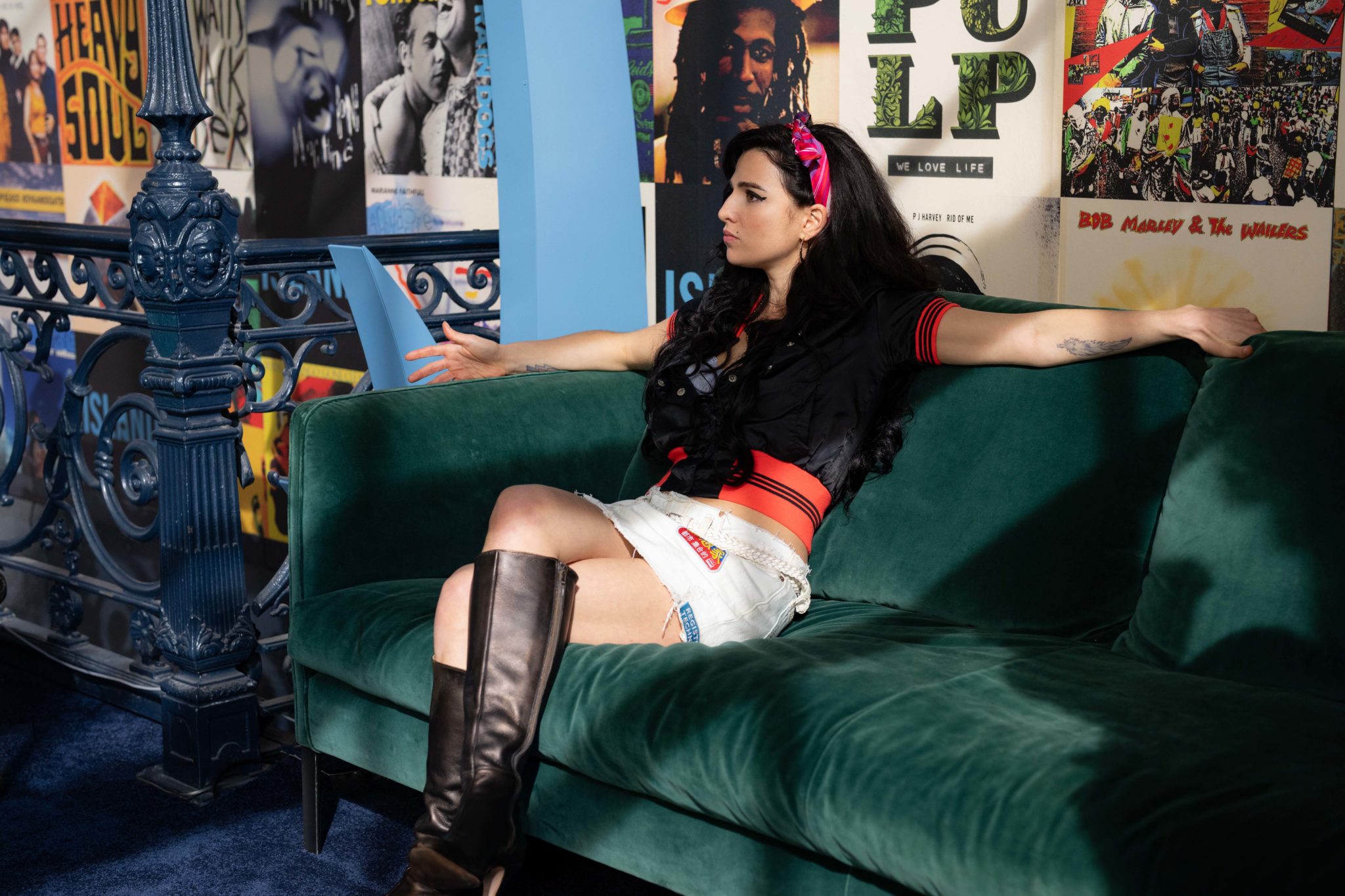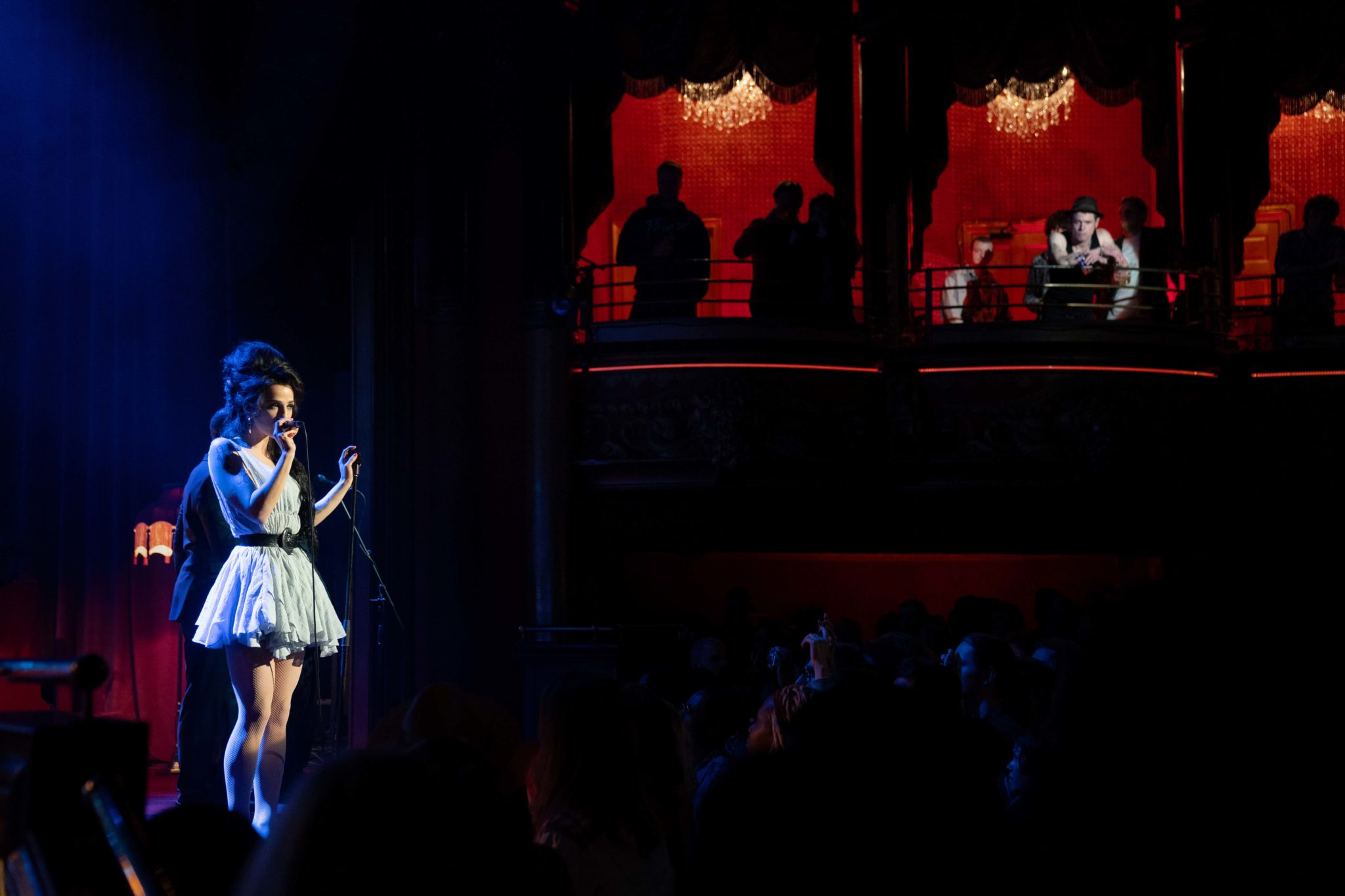- Film And TV
- 15 Apr 24
Back to Black: "I’m really proud of this film, because it’s got the courage to say the villain was addiction – and paparazzi"

Director Sam Taylor-Johnson, and stars Marisa Abela and Eddie Marsan, discuss bringing to the screen the story of Amy Winehouse – the troubled but sublimely gifted artist whose songs touched a generation.
Back To Black, Sam Taylor-Johnson’s film about Amy Winehouse, has successfully stirred up controversy since it was announced. Inevitably, some fans have argued that no film could do the late, great singer justice. It was no surprise then, that stills from the set and early trailers, showing actress Marisa Abela playing the singer, were met with mixed reactions. There were some raised eyebrows too, when Amy’s father, Mitch Winehouse, endorsed the film.
However, director Sam Taylor-Johnson is having none of it. She is ready to defend what she sees as a love letter to Amy.
Back To Black feels like a distillation of themes that Taylor-Johnson has previously explored in her work: music and fame in Nowhere Boy; addiction in Million Little Pieces; and toxic and obsessive relationships in Fifty Shades Of Grey. Nowhere Boy was based on a biography written by John Lennon’s half-sister Julia Baird, and so Taylor-Johnson was used to researching the lives of famous musicians. The challenge with Winehouse – whose struggles were so thoroughly documented by paparazzi – was to find the personal story beneath the tabloid pictures.
“Having worked on Nowhere Boy, there was obviously a lot of people around that – McCartney, Lennon’s family, Yoko Ono and Beatles fans,” says Taylor-Johnson. “It was important to be respectful, hear all the stories and meet as many people as possible – but then just get my head down and tell the story I choose to tell.”
Taylor-Johnson is clear that she was never going to let anyone else dictate the narrative on Back To Black. On that point, the director pushes back against one of the major concerns surrounding the film – that working with the Winehouse estate limited her creative freedom.
“No, no – co-operation and approval are two different things,” Taylor-Black says. “When I started making the movie, I said to the producer, ‘I have to have complete creative freedom. There has to be no approvals or running this by so-and-so.’ Luckily, we had all the music approvals from both Universal and Sony.
“What was important to me personally, was that I was telling the story of these two parents and their daughter. So I went to meet with Mitch and Janice – I wanted to hear them and for them to feel heard. And then I did invite them to set one day to see the filming. I felt like I had to give them respect in that way. It was quite an intense, emotional day. But there was no ‘approval’.”

Marisa Abela with Lesley Manville in Back To Black
Asif Kapadia’s 2015 documentary, Amy, paints an unflattering portrait of Mitch Winehouse, depicting the former cab driver and classical jazz singer as greedy and uncaring, saying that his daughter didn’t need rehab (“If my Daddy thinks I’m fine,” as the song goes) and bringing a camera crew to a St. Lucia retreat, where Amy was supposed to be getting clean and healing.
Mitch also frequently gave interviews to newspapers and would go on daytime TV to speak about his daughter, leading to accusations that he was fame-hungry and money-grabbing.
CHARM AND CHARISMA
Actor Eddie Marsan disagrees, arguing simply that Mitch was ill-equipped to deal with his daughter’s addiction, her sudden fame, and the relentless media attention.
“I knew about a year in advance that I was playing Mitch,” says 55-year-old Marsan, who starred in Mike Leigh’s Happy-Go-Lucky, Adam McKay’s Vice and Showtime’s Ray Donovan. “And I knew there was a narrative about Mitch. But I had a friend who worked with Mitch and Amy, so I asked him – from his first-hand experience – what he thought, and he said that he liked Mitch.
“He thought he was a father dealing with an impossible situation, who tried his best and made mistakes. I thought, well, that’s a very healthy perspective. I had decided that I wouldn’t play the part if it was sanitised or demonised in any way. I would only play a human being. So when I got the script from Matt and saw Sam’s vision, I realised we were all on the same page.
“When someone like Amy dies – someone so young, who affected our lives in such a profound way – there’s a collective trauma, and part of the way you deal with trauma is trying to make sense of it. So you blame Mitch, or you blame Blake – and in blaming them, you make Amy the victim . You’re robbing her of the creative impetus in her own life. We accept that narrative because we think, ‘Well, if my daughter doesn’t marry someone (feckless), or if I don’t behave the way that Mitch behaves, then my daughter or my child won’t die of addiction.’ But addiction is not like that. Addiction is random. It’s arbitrary, it’s cruel and it kills people.
“I’m really proud of this film,” he adds, “because it’s got the courage to say the villain was addiction – and paparazzi. And I’ll tell you why paparazzi is the villain. There’s a reason why these recovery programmes are called Alcoholics Anonymous and Narcotics Anonymous – because you need anonymity and privacy to deal with addiction. And Amy was never afforded privacy – they hounded and humiliated her.”
Amy’s relationship with Mitch Winehouse is portrayed as warm and loving. And while the film does tackle her dysfunctional relationship with Blake Fielder-Civil – his drug addiction, their violent arguments, and his prison term for assaulting a bar owner – some grimier details are omitted, including when he brought drugs to her in rehab.

Marisa Abela as Amy Winehouse and Jack O'Connell as Blake Fielder-Civil
In a director’s note, Taylor-Johnson writes that she wanted to make a film “from Amy’s perspective.” The filmmaker says she focused on the lyrics and inspiration behind Amy’s multi-award winning album, Back To Black, which chronicled her relationship with Fielder-Civil, as well as her struggles with addiction and depression.
“It is the framework for my film,” says the director’s note. “Amy’s heartbeat, louder with every heartbreak. Every song is a devotional outpouring of her love story between her and Blake. This is a love story, it is also a love letter to her, and it is told in her voice, her words and her perspective. She sees only good because love is blind.”
This was the approach embraced by writer Matt Greenhalgh, who combed through Amy’s lyrics and her utterances, to capture her perspective. Greenhalgh very deliberately wanted to illustrate what Amy saw in Blake.
“It was important to show there was a genuine love there,” says Greenhalgh. “It was mired in toxicity sometimes – but she loved him, and he loved her. It would have been easy to paint him as the villain, but there was another story to be told.”
From this perspective, the film’s focus makes sense, including the close relationship between Amy and her grandmother Cynthia (Lesley Manville), and the way Cynthia’s death affected the singer. Jack O’Connell’s charm and charisma also captures why Winehouse would have fallen for him.
PARADOX AND NUANCE
Marisa Abela, meanwhile, delivers impressive renditions of Winehouse’s biggest hits.
“In my mind, I was never going use the voice of the actress,” Taylor-Johnston says, “because Amy’s voice is incredibly distinctive and familiar, and so hard to emulate. But Marisa trained until she got to a place where her voice could tell us the story in an emotional way that connected. You know it’s not Amy, but she delivers it in a way that’s so soulful, you believe her.”
Abela threw herself into the challenge, taking singing lessons for two-and-a-half hours a day, every day, for four months. She also worked closely with record producer Giles Martin to replicate Amy’s singing style.

“I sing, but I’ve never tried singing in the style of anyone, let alone Amy, who has such a specific and authentic style,” says Abela, who like Winehouse, is from North London. “I don’t think any of us were sure at the beginning how much we were going to be using my voice. But it was important to me to do everything I could to pour myself into this role.”
There are several live performances recreated in the film: Amy’s 2008 Glastonbury set, and her appearance for the 2008 Grammys, where she won Record of the Year for ‘Rehab’.
Eddie Marsan believes it was the rawness of Amy’s style that meant so much to audiences.
“There’s an authenticity to her voice,” muses Marsen. “I think blues comes from trauma – and unlike other art forms or musical genres, it isn’t manipulative. If you look at somebody like Miles Davis, when he played the Monterey Jazz Festival in 1955, everybody wanted him to do something more commercial to guarantee he would get a record deal, but he was going through such crap he needed to go on there and play a ballad, because that was the consciousness he needed to reach to deal with his own stuff. And because it was authentic, people connected with it.
“He became a legend – and it’s the same with Amy. She didn’t want to be a pop star. She didn’t want to be a Spice Girl. She didn’t want to be famous. She was going through terrible things internally, and the music was a means by which she could be objective in the face of her trauma. And it helped other people be objective in the face of their trauma. That’s why she connects to us so much.”

Abela went through a physical transformation, donning Winehouse’s signature beehive and eyeliner, and losing some weight to show the ravages of the singer’s bulimia. But beyond the aesthetic changes, it was vital for Abela to capture Winehouse’s spirit: her wit, joy and charisma.
“I felt a big responsibility,” says Abela. “The technical stuff was difficult, learning to sing and play guitar, and to move and sound like her. But for me, the most important thing is people walking away with the feeling they’ve been with her during this movie. So it’s that kind of intangible thing, that essence of a person you try and conjure – that was was the thing I was most determined to capture.”
Eddie Marsan admires the film’s refusal to offer easy answers.
“Bad acting is playing binary interpretations of characters,” he says. “Good acting is embracing paradox and nuance, and that was evident within the script. There’s many different sides to these characters. The whole film is challenging a binary narrative.”
Sam Taylor-Johnsonis well aware of the protective love that fans have for Amy Winehouse.
“There is no greater love than the love people have for Amy,” she concludes. “Her music touched their souls, and provoked their hearts into feeling she is theirs and theirs alone. A small bird of a woman with the power of a lioness and a voice that transcends our time. Bringing Amy’s story to life is a privilege.”
• Back To Black is in cinemas now.
RELATED

- Film And TV
- 01 Apr 24
Celebrate the iconic Amy Winehouse with Back to Black - in cinemas April 12

- Film And TV
- 16 Jan 24
Mark Ronson shares his feelings on the upcoming Amy Winehouse biopic ‘Back To Black’
RELATED

- Film And TV
- 06 Dec 23
Amy Winehouse biopic Back to Black receives release date

- Film And TV
- 12 Jul 22
Official Amy Winehouse biopic in the works

- Film And TV
- 31 Mar 21





